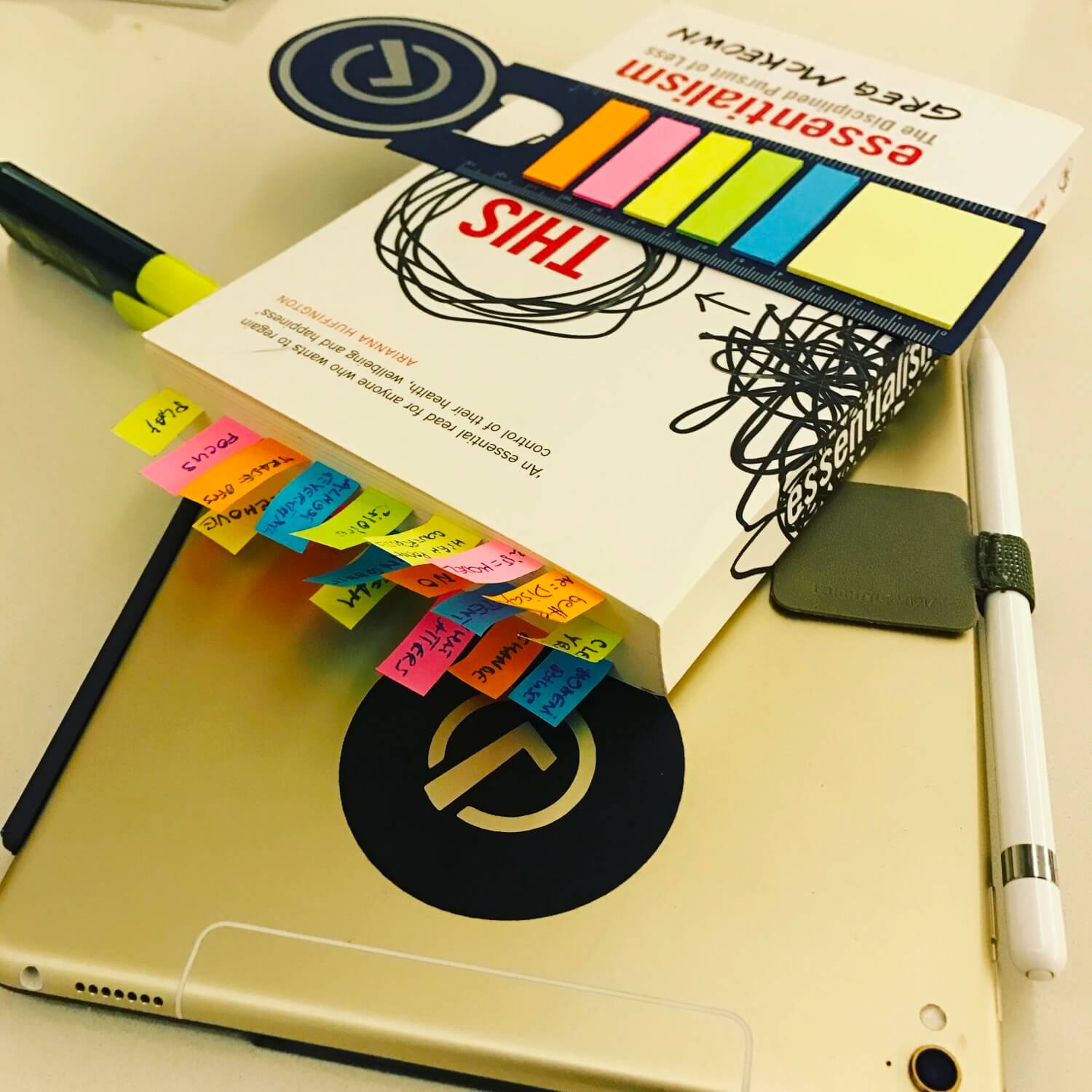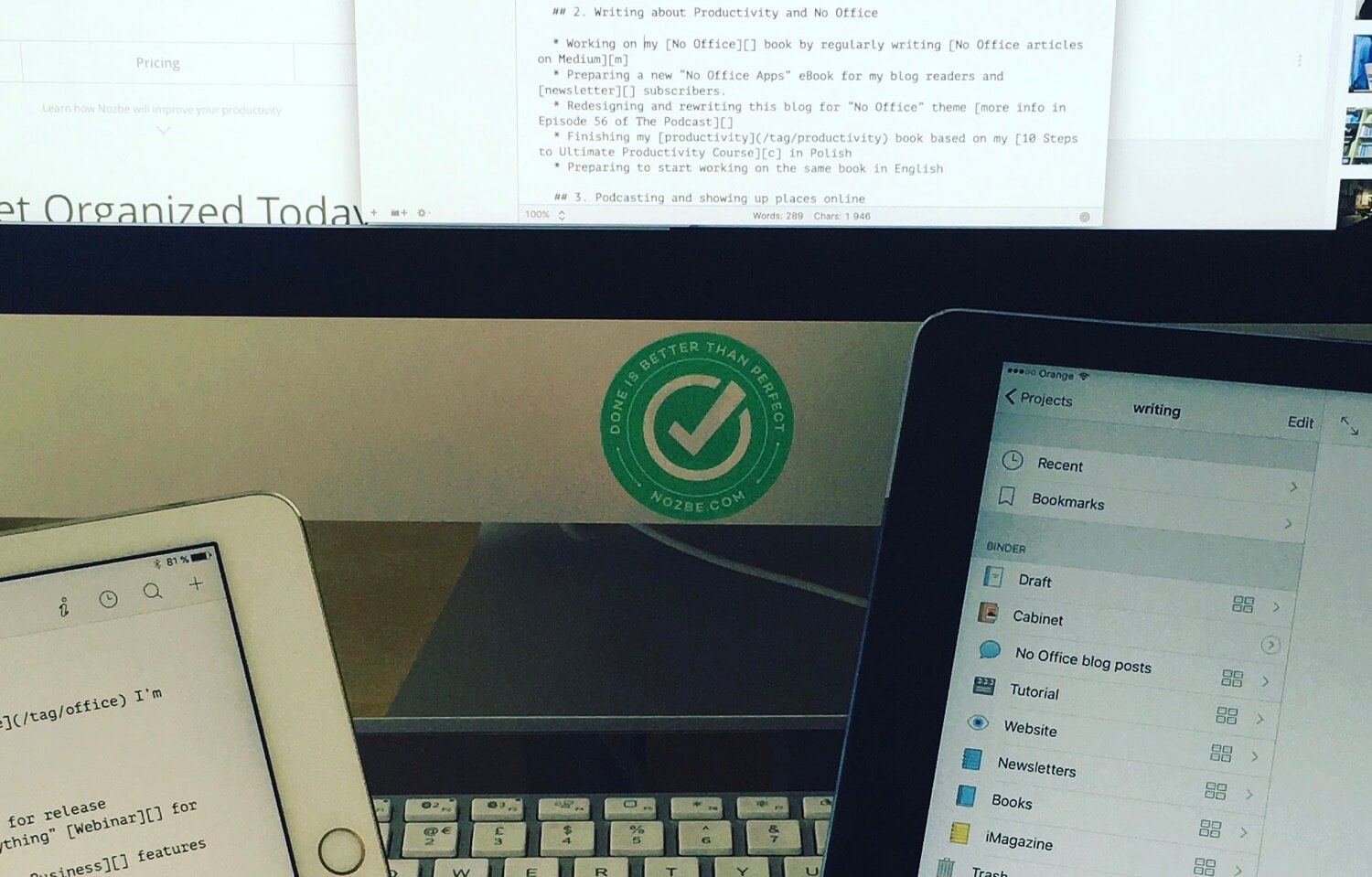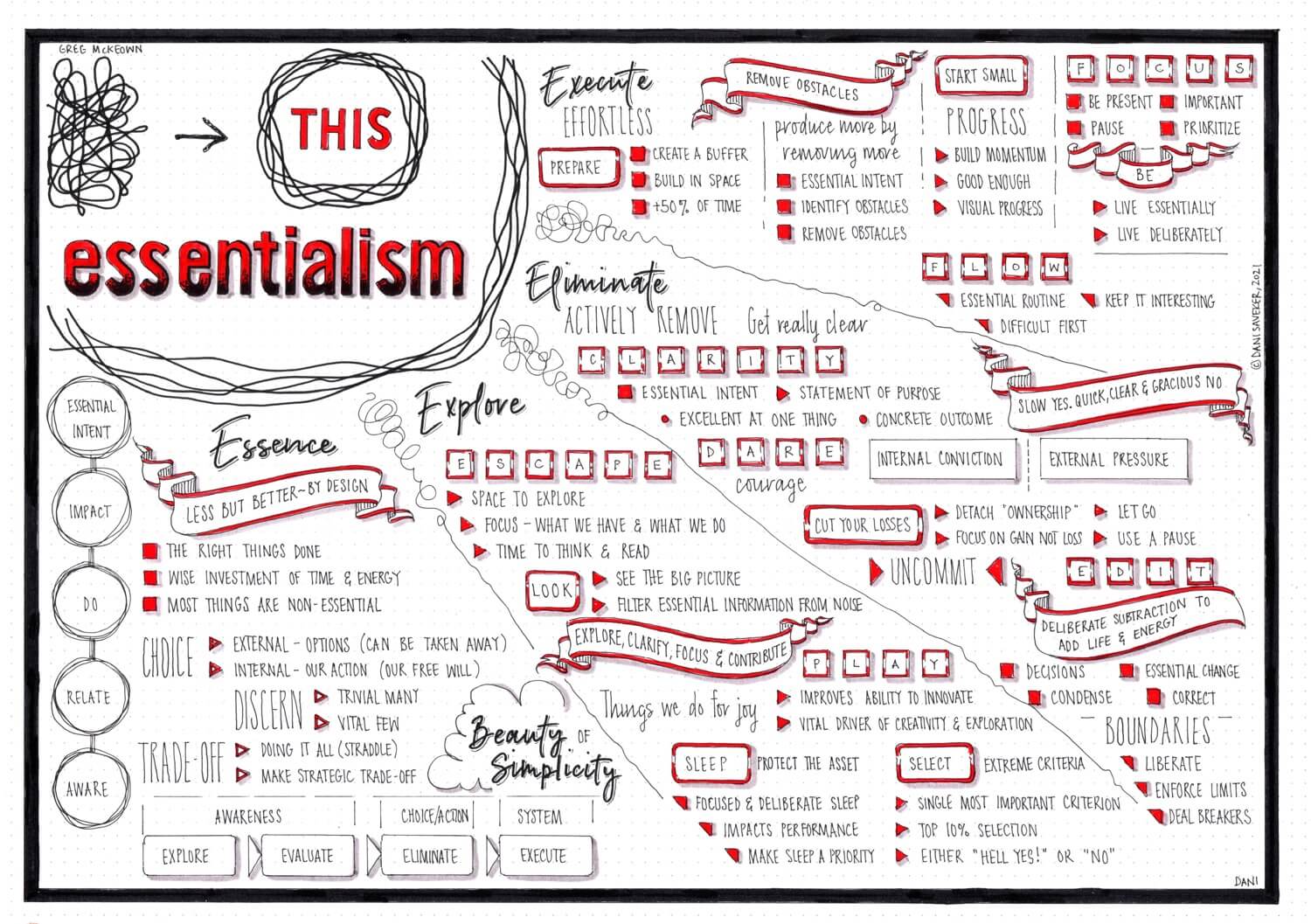Highlights from Greg McKeown’s book Essentialism - the disciplined pursuit of less… but better - how to become an essentialist?
📖Books
I’ve first written about this book over two years ago as I’ve listened to it twice since then and now I’ve read it in a physical form at the beginning of this year just after I’ve interviewed the author for last issue of the Productive! Magazine. I’ve highlighted many parts of the book and decided to write them down and share them with you all. Hope you’ll add your favorite bits and pieces in the comments - and if you haven’t read the book yet, get it from Audible or Amazon or anyplace else. Enjoy my essential highlights:

Essentialism is a pursuit of a life when you’re doing less, but better
The book starts with a great quote on productivity:
Essentialism is not about how to get more things done, it’s about how to get the right things done. It’s about the wisest possible investment of your time.
The author quotes one of the most famous designers ever, Dieter Rams who would always say that with his designs he’s trying to achieve a goal of “Weniger aber besser” - which translated from German exactly means: “less but better”.
Essentialism is a disciplined pursuit because it’s a systematic approach for determining where our highest point of contribution lies. The author argues that by investing in fewer things we have the satisfying experience of making significant progress in the things that mater most.
Essentialism means living by design not by default.
Which basically means that it’s up to you to decide what you want to do with your time on this planet - because as always: “If you don’t prioritize your life, someone else will.”
“The idea is to live a life true to yourself not the life others expect from you”
Here’s more:
Essentialism is a disciplined pursuit like deliberate practice from the book “Peak”
I’ve reviewed the book “Peak” by Anders Ericsson on my blog before and on the podcast and the concept of deliberate practice is very similar to the disciplined pursuit of becoming an essentialist - you have to practice consciously, create habits that support this and really enjoy the journey and not just think of the destination.
We have to create a system for removing obstacles and making execution as easy as possible.
Success can be a problem
This is when the book really struck a cord for me:
The pursuit of success can be a catalyst for failure. Focusing on success can become an undisciplined pursuit of more.
I’m guilty as charged here. With more success come more opportunities and… more distractions from the thing we should be really doing!
We have to answer this question: Tell me what is your plan to do with your one wild and precious life?
We don’t want to spend our life doing things we detest or buying things we don’t need with money we don’t have to impress people we don’t like.
Learn to understand your choices and your ability to choose
The thing is that if we surrender our ability to choose, something or someone else will step in to choose for us. That’s why an essentialist must spend as much time as possible exploring, listening, debating, questioning and thinking. Very often doing less and thinking more really produces better outcomes!
Options (things) can be taken away why our core ability to choose (free will) cannot be.
Change your language: instead of saying “I have to” say “I choose to”. This way you really know it’s all up to you!
The essentialist doesn’t just recognize the power of choice he celebrates it.
I love how Michael Hyatt also says we can even use the phrase “I get to” - which gives our choice a nice dash of gratitude, right?
Work hard… but better
We work hard because we think that everything we’re working on is sooooo important… and it’s really not.
You cannot overestimate the unimportance of practically everything.
Working hard is important but more effort does not always yield more results! It’s because sometimes what we don’t do is just as important as what we do.
Certain efforts actually produce exponentially more results than others.
Everything is a trade-off
Greg in one of his interviews said that a definition of a non-essentialist would be a person who thinks that they are no trade-offs. That you can have a cake and eat it at the same time. Unfortunately this has been my attitude for so many years…
The reality is saying yes to an opportunity by definition requires saying no to several others.
Because:
We can try to avoid the reality of trade-offs but we can’t escape them
Just like choices, we can’t be rejecting trade-offs, we must embrace them because:
As painful as they can sometimes be trade-offs represent a significant opportunity!
Explore your options
In the world we live in we basically run from one thing to another. We have no time to think, breathe and explore all the possibilities. That’s why very often we choose unwisely.
Before you can evaluate what is and isn’t essential you first need to explore your options.
Author argues that a true essentialist spends more time thinking and analyzing all the options than anyone else:
The purpose of the exploration is to discern the vital few from the trivial many. For that we need a space to think, time to look and listen, permission to play, wisdom to sleep and the discipline to apply highly selective criteria to the choices we make.
Focus on your work
This goes back to the concept of “Deep Work” from the book by the same title by Cal Newport (discussed in #46 of The Podcast):
In order to have focus we need to escape to focus
We have to make sure we schedule and protect time devoted to deep work and maximize our time spent in this state…
Focus on the flow. The essentialist designs a routine that makes achieving what you have identified as essential to the default position.
Play
Something that I need to keep reminding myself when I spend time with my girls:
Nothing fires up the brain like play. Play stimulates the part of the brain involved in both careful logical reasoning and carefree unbound exploration.
I still think I should be spending more time playing with my kids… and I’m not doing that.
Sleep to protect the asset
When I read the book “Sleep Smarter” by Shawn Stevenson I understood it even better:
A good night’s sleep actually makes us more productive not less.
It’s because when we sleep, our body really re-builds itself and re-calibrates:
When we wake up our brains make may have made new neural connections thereby opening up a broader range of solutions to problems literally overnight.
“If it isn’t a clear YES then it’s a clear NO”
This one strikes hard. I keep falling into this trap. What I should be doing is this:
Say YES to only the top 10% of opportunities
This is so hard… we very often want to do more, think some opportunities are “good enough” and give in to the non-essential…
Social media, news… and FOMO…
This is why I’m constantly fighting my urge to check Twitter or Instagram…
Avoid FOMO fear of missing out. If we ever say YES because it is an easy reward, we run the risk of having later to say NO to a more meaningful one.
This is a trap. That’s why we’re discussing tricks and habits that help us avoid falling back in…
Essentialism is not NO-ism but learn to say NO…
I like this quote:
People are effective because they say NO.
And this:
People respect and admire those with the courage of conviction to say NO
And remember that:
A clear NO can you be more graceful than a vague or noncommittal YES
Because if we don’t say it clear - people will take it one way or the other…
Joy - no joy - how to uncommit…
Just like in Marie Kondo’s guide to decluttering we should learn to uncommit from things and possessions by practicing our decision-making muscles. I like her approach to choosing clothes to keep: “does it bring me joy?” - which helps us fight our internal urge to keep everything we’ve got.
We have a bias when it comes to non-essential activities as well as belongings. When we feel we own an activity it becomes harder to uncommit. Only when we admit we have made a mistake in committing to something, can we make a mistake a part of our past.
Greg McKeown also admitted that a phrase that helps him uncommit is this one:
You are not married to this.
The problem is that we’re just saying YES to too many things easily:
Stop making casual commitments. Every use of time energy or resources have to justify itself anew - if it no longer fits, eliminate it altogether!
It’s this attitude that we think what we do for others really matters… when in fact it very often doesn’t - so ask yourself this:
Are there commitments you routinely make to customers colleagues friends or even family members that you have always assumed made a big difference to them but in fact they might barely notice?
There’s also this problem of letting go of things that are very dear to us… but no longer serve their purpose:
Kill your darlings! Even when this breaks your egocentric heart, kill your darlings!
Which leads us to editing…
Editing is key - become an editor, curator…
This is something I keep struggling with - as the founder and leader of Nozbe:
CEO has to be chief editor of the company. A good editor is someone who uses deliberate subtraction to actually add life to the ideas setting plot and characters.
I can see that in some of the code my programmers are writing. Sometimes they are literally adding features by removing lines of code…
An essentialist produces more, brings forth more, by removing more instead of doing more.
That’s why we need time and focus for editing.
To write is human, to edit is divine…
When I’m editing our home movies I know how much time it takes me but the outcome is well worth it:
Becoming an essentialist means making cutting, condensing and correcting a natural part of our daily routine. It means making editing a natural cadence in our lives.
Embrace the constraints…
Very often we believe constraints are our problems, but again, we should embrace them:
Limits set boundaries. If you have limits you will become limitless.
Limits and constraints are blessing in disguise as they let us focus on what’s truly essential.
Create buffer, add margins…
One of the certainties of life is that it’s very uncertain, that’s why:
The essentialist looks ahead. She plans, she prepares for different contingencies, she expects the unexpected, she creates buffer to prepare for the unforeseen.
You might want to think you’re completely in control but you never truly are:
Essentialist accept the reality that we can never fully anticipate or prepare for every scenario or eventuality. The future is simply too unpredictable. Instead they build in buffers to reduce the friction caused by the unexpected.
That’s why we need to plan buffers, give ourselves some additional space and time to have it when we truly need it in order to execute calmly and without too much stress.
Keep walking - Minimum Viable Progress
In the “startup world” there’s the concept of MVP - Minimum Viable Product - which means you’re building a prototype that focuses on just getting the essential job done and nothing else.
I believe in small wins and small steps - and so does Greg McKeown in this book - he introduces the concept of Minimum Viable Progress:
It’s all about progress. It’s about small wins. Of all the things that can boost emotions motivation and perceptions during a workday, the single most important is making progress in meaningful work.
That’s why me, as the CEO of Nozbe, I need to focus on keeping people moving forward, helping them in progressing towards their goals… but very often it’s me who’s holding them back:
Start with your first win and use that momentum to work towards the next win and the next one and so on until you have a significant breakthrough.
I need to be fostering this:
When we start small and reward progress we end up achieving more than when we set big lofty and often impossible goals.
And be like this guy:
By checking in with people frequently to reward small wins and help people remove obstacles, he bolsters the team’s motivation and focus. He enables them to make more meaningful progress.
Because:
There is something powerful about visibly seeing progress towards a goal.
That’s why I need to dedicate more time to my team than I do now:
Taking time to get clear about the one thing that is actually required, the essentialist leader makes follow up so easy and fictionless that it actually happens.
This sticker on my iMac reminds me daily about importance of progress “done is better than perfect”:

Truly live in the moment - enjoy the present…
When you focus on what’s now, you’ll succeed more often:
The way of the essentialist is to tune into the present.
There is no guarantee that you’ll win every time - because there are things beyond your control…. but what you can be sure of is that you’ve given your best:
There is a difference between losing and being beaten.
Remember to stop and listen to yourself:
When faced with so many tasks and obligations that you can’t figure out which to tackle first stop take a deep breath get present in the moment and ask yourself what is the most important this very second.
And again a friendly reminder how we should look at our family time:
In the work do what you enjoy and in family life be completely present.
Create your “essential intent”
This concept is very powerful - it tells us what’s really important - at Nozbe we also have one and you should work on yours:
Essential intent is to make a decision that eliminates 1000 later decisions. It has to be meaningful and memorable. If we could be truly excellent at only one thing, what would it be?
This is not easy, but it’s focused:
There are often multiple obstacles to achieving any essential intent however at any one time there is only ever one priority.
Work on your “essential skills”
Again, just like in the book Peak, it’s not always about reaching goals but about developing skills that make you a better version of you:
Learning essential new skill is never easy but once we master them and make them automatic, we have won an enormous victory because the skill remains with us for the rest of our lives.
It’s a constant pursuit and development:
Becoming an essentialist is about living a life of meaning and purpose to become a better version of yourself.
It’s You 2.0 and beyond…
Ultimately this is you as an essentialist:
When other people are saying yes, you will find yourself saying no. When other people are doing, you will find yourself thinking. When other people are speaking, you will find yourself listening…
To sum it up:
A life of an essentialist is a life lived without regret.
Thanks to your own choices:
You’ll become proud of the life you have chosen to live
Here’s to us - essentialists!
I’ve written these notes and highlights for myself - hope they’ll serve you, too, as a reminder of the journey we have ahead of us to become essentialists. I keep stumbling. But I keep standing up and trying again. That’s why I needed to share this with you.
To Greg McKeown: thank you for writing this book and being so generous by sharing these ideas with us. We’ll try to become better versions of ourselves. Thank you!
Further reading:
- Get “Essentialism - the disciplined pursuit of less but better” by Greg McKeown on Audible or Amazon
- Read my previous short review of this book
- Watch my interview with Greg McKeown
- Or read the interview in the last issue of the Productive! Magazine
Bonus: Essentialism Visual Synopsis
Dani Saveker prepared a great Visual Synopsis of Essentialism:

Looking for more books to read? Check out complete and updated list of books I recommend